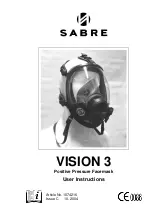
4
Appendix B
SRS Residual Gas Analyzer
Figure 2: Two Layouts of Post-Aperture Vacuum System.
The system shown in Figure 1 can be assembled as a simple package. Using a small (70
liter s
-1
or less) hybrid turbo pump and a diaphragm backing pump will eliminate any
concern of oil. The use of this pump pair also eliminates foreline traps and isolation
valves. The operation of the system should be simple: open the Hi-C valve at low
pressures, or open the sample valve at high pressures.
High Pressure Sampling (>100mbar)
At high pressure the aperture assembly is insufficient to reduce the pressure, while
maintaining response time. Consider an aperture that reduces the pressure from 10 mbar
to 10
-6
mbar when used with a 70 liter s
-1
turbo pump. The volumetric flowrate on the
high pressure side of the aperture would be 7 microliter s
-1
. Any dead volume on the high
pressure side of the aperture (Figure 3) would cause a large response time constant (t
c
=
volume / flowrate). If the aperture had a small dead volume of 1/2 inch of 0.250 OD tube
(0.028 wall), the time constant would be 35 seconds. This is not an acceptable response
time.
10 mbar
10 mbar
-6
dead volume
Figure 3: Small Dead Volume Slows Process Response time.
To achieve a fast response time, a capillary inlet is used with bypass pumping as shown
in Figure 4. The system reduces the pressure in two stages. Most of the sampled gas is
drawn through the capillary and directly to the diaphragm pump,
i.e
. bypasses the RGA.
The pressure at the exit of the capillary is about 1 mbar. A small amount of the sampled
gas is diverted to the RGA through an aperture. This configuration improves the
response time by two methods. First, the pressure on the high side of the aperture is held
to about 1 mbar. But even this pressure would give a time constant of 3.5 seconds in the
1/2 inch dead volume example mentioned above. The second method to decrease the
time constant is to ensure that any dead volume is well mixed. After the capillary, the gas
is traveling at significant velocity (several meters per second). Proper layout of the inlet
Summary of Contents for RGA100
Page 4: ...SRS Residual Gas Analyzer iv...
Page 18: ...xviii Command List SRS Residual Gas Analyzer...
Page 46: ...2 14 Residual Gas Analysis Basics SRS Residual Gas Analyzer...
Page 66: ......
Page 78: ...4 12 Mass Filter Power supply SRS Residual Gas Analyzer...
Page 104: ......
Page 107: ...Programming the RGA Head 6 3 SRS Residual Gas Analyzer Error Byte Definitions 6 69...
Page 216: ...8 26 Quadrupole filter cleaning SRS Residual Gas Analyzer...
Page 246: ...11 2 SRS Residual Gas Analyzer...
Page 247: ......
Page 248: ......
Page 268: ...Appendix B SRS Residual Gas Analyzer 7...
Page 312: ...Appendix D SRS Residual Gas Analyzer 27...
















































